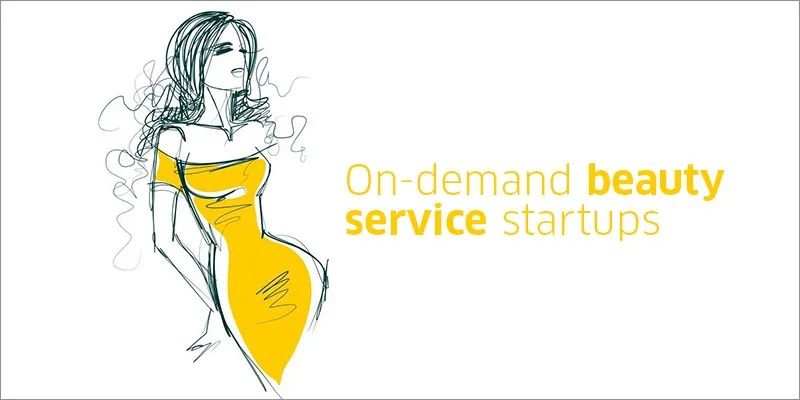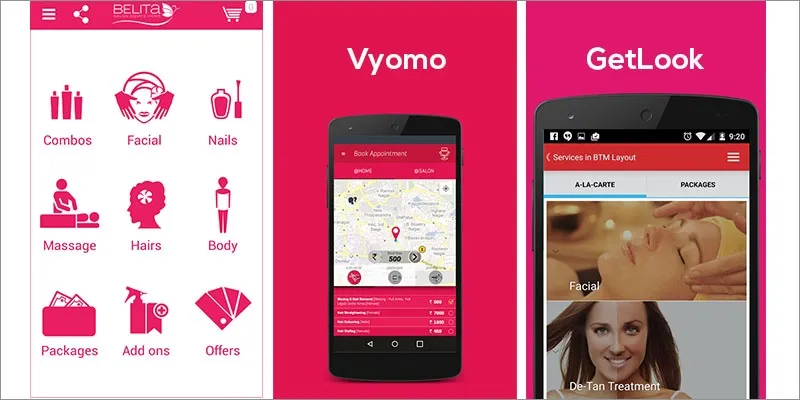On-demand beauty service startups are making inroads in urban India, will they make it big?
The on-demand phenomenon is catching on in India with various startups evangelising different niche services in the hyperlocal space. Right from grocery and handyman services to salons, everything in metros is now accessible on-the-go. To capture the fledgling USD five-billion beauty service segment, six startups have emerged in the last eight months.

Besides food, health and beauty services is touted as one of the biggest opportunities. On an average, a woman spends anywhere between Rs 2,000 and Rs 3,000 on a monthly basis on basic beauty rituals. And because professional women lead busy lives, some tend to prefer availing of such services at home. According to some industry estimates, the market size for beauty services pegs around USD 4.8 billion and it’s growing in India.
Let’s have a look at some promising startups and their growth till now:
Belita: Founded in 2010, Belita is the first on-demand beauty service startup. Over the past three years, it has closed two rounds of fund, including a Rs 2.5-crore angel round from a group of angel investors through LetsVenture and Lead Angels Network. Currently, the company does about 1,300 orders in a month with an average transaction size of Rs 2,000.
Vyomo: This startup which is backed by cricketer Yuvraj Singh has scaled quickly and claims to have served 17,000 customers and had 53,000 downloads within two months. The company says 30 per cent of app downloaders are using its service. It had raised Rs six crore in angel round from Yuvraj, TFS’s co-founder, Aprameya A and Qatar Investment Authority. Last month, it snapped up USD two million Series A from Rocket Internet.
GetLook: The brainchild of IIT-KGP graduates Gaurav Maheshwari and Ronak Sharda, GetLook offers the services of a beautician at the customer’s doorstep within two hours. With over 6,000 users, it is currently processing 800 to 900 appointments on a monthly basis, with an average ticket size of Rs 1,750.

VanityCube: This venture delivers on-demand professional and affordable beauty services at one’s doorstep across NCR region in as quickly as 90 minutes. The company processes 1,000 orders on a monthly basis with an average transaction size of Rs 800 to 1,000. VanityCube recently closed seed fund from unnamed angels.
StayGlad: Founded by IIT Kharagpur alumni Prateek Jain, Shashank Gupta, and Kavish Desai, Stayglad is a mobile marketplace for beauty services. It secured an undisclosed amount in a seed round led by Tracxn Labs and Sahil Barua, Co-founder, Delhivery. The company has not disclosed its traction or growth so far.
Bulbul: It offers on-demand beauty services via mobile apps and claims to have 4,000 registered users. It has about 1,000 bookings with 50 per cent repeat customers. The company aims to serve 200 customers in Chandigarh and Gurgaon on a daily basis.

Urban Indian class is ready for on-demand services
The on-demand phenomenon took off in India with cab service and the significant success experienced by startups like Ola, TaxiForSure and Jugnoo justifies the sizeable consumer interest in on-demand services. After cabs, grocery and vegetable delivery, and handyman services, on-demand beauty appears to be a potential niche to evangelise. Besides, consumer angels and VCs are also showering their love for the segment by having pumped in over Rs 18 crore so far this year.
Services have become a new product: Why angels are backing on-demand beauty startups?
Ronnie Screwvala, partner at Unilazer Venture, says,
On-demand home services comprise the new frontier of e-commerce where service is now a product. I believe large companies are going to be created in hyperlocal service segment”. The VC firm recently backed Timesaverz, a Mumbai-based platform for handyman services.
Busy lifestyles, rise in consumerism, strong economic backgrounds, and relatively better incomes are driving the growth of on-demand beauty space. Gurgaon-based software professional Roop Handa explains,
I work six days a week and hardly get time to visit a parlour. I don’t go parlours for any beauty services these days as I can avail them at my place
Hyperlocal space has outnumbered all other sectors in terms of gaining investor confidence in India this year. So far, the space has amassed more than USD 180 million in investment from VCs and angels.
Yuvraj Singh who backed Vyomo notes,
I am excited about the on-demand economy as it allows instant gratification and optimises efficiency to a great level. Also, it’s a low capital-intensive model and for a country like India, on-demand startups have potential to transform lives.
Impact on freelance beauty service professionals
For freelance salon professionals the opportunity came as a blessing. Unlike full-time employment, on-demand beauty startups generally work on a revenue-sharing model. This is a paradigm shift for them, potentially increasing their monthly income by more than three times.
Is viability of on-demand service startups questionable?
While VCs are gung ho about the prospects of on-demand startups, a section of experts express concerns over the viability of hyperlocal startups in the long run. Kashyap Deorah, serial entrepreneur cautions startups in India with memories of the demise of Webvan, the US-based grocery delivery platform during the first dot-com bubble.
It had raised USD 400 million from blue-chip VC funds like Sequoia Capital, Benchmark Capital, Softbank, and Goldman Sachs, and had also gone for an IPO. But it could not survive and filed for bankruptcy soon after it made its debut in the public market.
So far, hyperlocal startups have been a sweet zone for VCs, with about two dozens of them attracting close to USD 200 million in investment this year. However, a majority of them like their e-commerce peers are burning VCs’ money without strong focus on unit economics. At present, there are eight serious players operating in the on-demand beauty space of which five are backed by investors. Pointing out the reasons for access capital in Indian startup ecosystem, Kashyap said in an earlier interaction with YourStory:
A lot of VCs did not bet on China owing to the political uncertainty and risk. But these VCs realised that they lost a big goldmine in China and as a consequence they are overboarding in India.

Unfazed by the question of viability and unit economics, startups in the on-demand beauty space continue to gain interest of big groups like Rocket Internet. The Berlin-based group had invested in Vyomo. According to Vivek Bhiani, Lead Partner at BedRock Venture, the on-demand economy is here to stay and startups focusing on it will have bright prospects. He says,
I see massive scale and positive unit economics in the hyperlocal space. We are evaluating some deals in the space.
Consolidation and bloodbath are likely in on-demand beauty niche
Within a short span, the on-demand beauty service segment has had significant adoption, and given their busy working schedules, more women are opting for them. The beauty service space is estimated at USD 5 billion and the opportunity is big enough to produce two-three multi-million dollar companies. However, the segment is also gearing towards consolidation.
About 60 per cent of startups in the on-demand beauty space had raised money on seed level. However, it will be interesting to see whether VCs also show the same amount of love while leading Series A and further rounds in this niche.
On the lines of e-commerce, we may see some horizontal service aggregators acquiring on-demand beauty service startups in the future. We have witnessed horizontal e-commerce players acquiring niche-focussed startups to bring quick scale and the on-demand peers are likely to follow the same path. While a couple of on-demand beauty startups will emerge as leaders and a few will get consolidated, the remaining may be subjected to a bloodbath.







